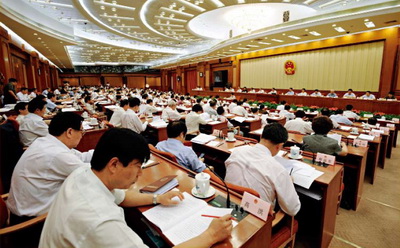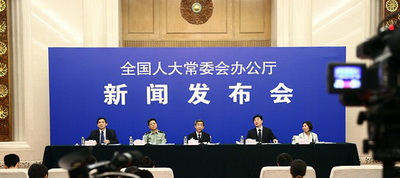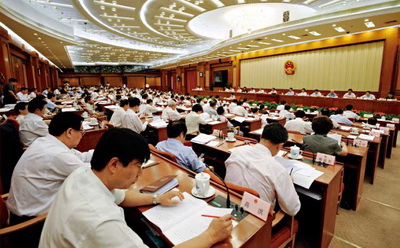What is China's People's Congress Up To?

Only 152 of the 175 delegates that make up the Standing Committee of China's top legislature attended a six day meeting of the body in Beijing late last month.
The Standing Committee of the National People's Congress (NPC) normally meets once every couple of months in order to review and debate draft laws, listen to and deliberate on various amendments to existing laws and also to receive special reports on a variety of subjects.
Outside of the annual plenary meeting of the full congress of 2,979 delegates (down from the original 2,987 deputies elected in 2008), that is held in Beijing every March, the Standing Committee represents the authority of the NPC.
This was the sixteenth meeting of the 11th NPC Standing Committtee which was formed in March 2008 and which will end its term in March 2013 after serving for 5 years.
During last month's meeting, the attention of both domestic and overseas media was focused on proposed amendments to China's Criminal Law, including a proposal to reduce the number of economic crimes which are punishable by the death penalty down to 55 from the existing 68.
However, many other issues were also discussed at the meeting, with sessions ranging from discussion of whether China should ratify an international anti-terrorism treaty to the passing of amendments to Hong Kong's Basic Law.
On the last day of the meeting, as the legislature had voted to approve an amendment to the Law on Officers in the Reserve Forces and also passed the People's Mediation Law, President Hu Jintao announced that according to presidential decree 33 and 34, the laws would come into effect on Jan 1, 2011.
The Congress also announced that it had agreed to ratify the UN International Convention for the Suppression of Acts of Nuclear Terrorism.
The legislature also passed two amendments to Hong Kong's Basic Law - which included amendments to the methods of selecting the region's chief executive and forming the Legislative Council in 2012.
New Legislation
1. Lawmakers passed amendments to the Law on Officers in Reserve Forces.
In a vote taken on the last day of the meeting, the amendment was passed unanimously. In the press conference held after the meeting had concluded, Major General Yu Daqing of the PLA's General Political Department vaguely explained that the amendements to the law were made in order to help bring the 15 year-old law up-to-date with changing circumstances caused by military modernization, social and economic developments and experience learnt over recent years.
The full text of the amendments can be found here (in Chinese).
2. Lawmakers passed the People's Mediation Law
In a vote taken on the last day of the meeting, the law was passed with 143 votes in favor, 2 against and 7 abstentations. You can read more details about the new law here.
3. The legislature also passed two amendments to Hong Kong's Basic Law - which included amendments to the methods of selecting the region's chief executive and forming the Legislative Council in 2012.
More details here.
4. The congress also agreed to ratify the UN International Convention for the Suppression of Acts of Nuclear Terrorism
More details on the decision can be found here, the full text of the UN convention is available here.
Amendments to China's Criminal Law
On the first day of meeting, delegates heard and deliberated on the first reading of proposed amendments to the country's Criminal Law.
On Wednesday August 25, delegates split up into small groups to dicuss the proposed changes to the law. NPC representatives weighed whether people found guilyy of smuggling cultural relics, precious metals or animals or people found guilty of various fraud charges, should continue to face the prospect of being executed.
The proposed amendment also contained provisions that would exempt criminals aged over 75 years from being executed.
However, the amendment did instead propose raising the upper limit on fixed prison sentences for several crimes from the current maximum of 20 years to 25 years.
There are also provisions that will allow for the establishment of "community correctional facilities" to house detainees charged with non-violent or petty crimes.
Deputies aslo discussed whether drink driving, intentionally defaulting on payment to employees and illegal trade in human organs should be added as crimes to the Criminal Law.
According to the proposed amendments, drivers who cause a serious accident while driving under the influence, will be subject to criminal detention and a fine.
The amendment proposes to impose a fixed prison term of less than three years for those who intentionally default on payment to employees and between three years and seven years jail for those whose refusal to pay results in serious consequences.
The proposed amendments also provide a clearer definition of "underworld organized crime" and lists tougher punishments for crimes carried out by such organizations. As this was only the first reading of the amendments, lawmakers did not take a vote on whether to pass the amendments but agreed to discuss the proposals further during the October meeting of the congress.
The full text of the proposed amendments can be found here.

Other Issues on the Agenda
1. Lawmakers heard and deliberated a draft law on the application of laws to civil relationships involving foreign interests
According to China Radio International, this draft law deals with cases "involving Chinese nationals married to foreigners: under the proposed new law, such couples would be required to settle disputes according to the law of the country where they spent most of their married life."
The law applies to conflicts involving divorce and inheritance.
According to Xinhua, each year, courts across China receive more than 10,000 foreign-related civil and commercial cases.
2. Lawmakers heard and deliberated a draft amendment to the law on deputies to the NPC and local People's Congresses
3. Delegates heard and deliberated on a draft law on Intangible Cultural Heritage
4. Delegates heard and deliberated on a draft revision of the Soil and Water Conservation Law
5. Delegates listened to Zhang Ping, director of the National Development and Reform Commission, deliver the State Council's report on the implementation of the national economic and social development plan.
The full text of Zhang Ping's report is available here in Chinese.
6. Delegates listened to Minister of Finance Xie Xuren as he delivered a report on behalf of the State Council regarding the implementation of the central budget during the first seven months of 2010.
7. The legislature listened to and discussed a report presented by Zhang Ping of the NDRC on China's "grain security"
The full text of the report in Chinese is available here.
8. Delegates listened to Chen Zhili's, vice chairwoman of the NPC Standing Committee, report on inspection of the enforcement of the Cleaner Production Promotion Law.
The law was enacted in 2002 with the aim of promoting cleaner production and of increasing energy efficiency and reducing pollution.
The full text of the report in Chinese is available here.
9. The congress heard a report on the NPC Standing Committee's research results on issues for the formulation of the 12th Five-Year Plan (2011-2015)
According to news reports, the NPC completed 15 research reports on 14 major subjects from March to July to provide proposals for the formulation of the keynote plan, after Wu Bangguo, chairman of the NPC Standing Committee, called for the research at the annual legislative session in March. Among the reports was one devoted to reforming national income distribution.
The Chinese text of many of these reports is available here.
10. Delegates listened to Wu Bangguo's report about his trip to France, Serbia and Switzerland and his participation in the third World Conference of Speakers of Parliament in Geneva.
11. Delegates also listend to a report about the status of new deputies who had been appointed to the NPC.
12. On the last day of the meeting, the congress considered the various appointments and dismissals.
According to media reports, the Standing Committee of the NPC approved the appointment of Chen Jianguo to the position of vice chairman of the Internal and Judicial Affairs Committee of the NPC.
The congress also approved the appointment of Shi Zongyuan, the former Party Secretary of Guizhou, to the position of vice chairman of the Education, Science, Culture and Public Health Committee of the 11th National People's Congress.
An Jian was removed from the deputy director position of the Legislative Affairs Commission, the Standing Committee's legislative body, and has since been appointed to the position of Deputy Director-General and the Member of Party Leadership Group of the State Council Legislative Affairs Office.
Wang Fengchao was removed from his position as a member of the Hong Kong Special Administrative Region Basic Law Committee and Li Gang was appointmented to the same committee.
Tony Liu also contributed to this report
Links and Sources
NPC Official Site: Standing Committee of NPC
Xinhua: China's top legislature opens bimonthly session
New York Times: People's Congress Gets to Work in China
CRI: China mulls law on foreign-related civil, commercial conflicts
NPC Official Site: Official Report on Meetings Conclusion (Chinese)
UN: International Convention for the Suppression of Acts of Nuclear Terrorism
People's Daily: Short Video of Final Press Conference (Chinese)
China News Service: Pics from Press Conference
China News Service - Text of Final Press Conference
The views posted here belong to the commentor, and are not representative of the Economic Observer |
Related Stories
Popular

- BOOK REVIEW
- September Issue of EO's Book Review
- Highlights from this month's edition: Talking Bubbles with Andy Xie
Interactive
Multimedia

- EEO.COM.CN The Economic Observer Online
- Bldg 7A, Xinghua Dongli, Dongcheng District
- Beijing 100013
- Phone: +86 (10) 6420 9024
- Copyright The Economic Observer Online 2001-2011
















